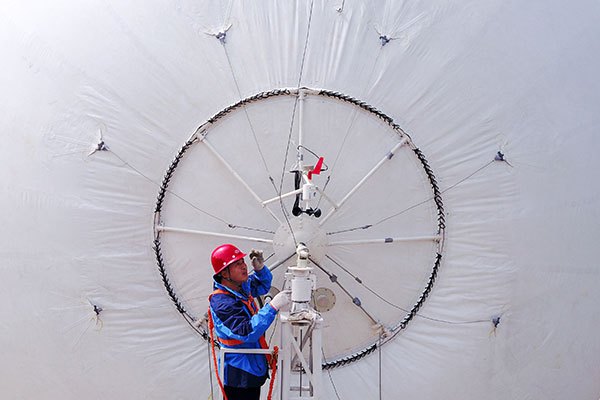CETC speeds reform efforts

 |
| An employee of China Electronics Technology Group Corp checks a balloon before its ascent for an experiment.[Photo/Xinhua] |
"Our goal is to lead the development of China's electronics industry and build the cornerstone of national security," said Xiong Qunli, chairman of CETC. "We will ramp up resources to cultivate innovation and accelerate structural reform."
As of August, the company has successfully integrated 19 research institutes to set up seven units, simplifying hierarchy, boosting operational efficiency and saving costs.
CETC has already been working to overhaul its structure, which previously consisted of 47 electronic information research institutes. Such a fragmented structure led to a slate of problems such as scattered investments, redundant construction and disordered internal competition.
"We have shifted our focus to five areas - military electronics, civilian products, international management, scientific and technological innovation, and asset management and capital operation," Xiong said.
In 2016, CETC recorded 188 billion yuan ($ 28.7 billion) in revenue, marking an almost 20-fold increase compared to the number in 2002, when it was founded. Its profit also surged to 18.3 billion yuan, highlighting the company's strong momentum.
The reform is part of the wider SOE reforms administered by the State-owned Assets Supervision and Administration Commission, the country's top regulator of SOEs. It is designed to increase the competitiveness of SOEs as China works to replace old growth drivers with new ones, with emphasis on innovation, technology and efficiency.
According to Xiong, the company also has been closely aligning businesses with national strategies. It has stepped up overseas investments to better serve countries and regions related to the Belt and Road Initiative. CETC is also ramping up resources to cultivate innovation.
It has set up an intellectual property center, intended to motivate employees to come up with innovative ideas and experimenting with cutting-edge technologies. As part of its financial incentives, the company said at least half of the revenue generated from new patents will be rewarded to core employees who invent the patent.
As a result, the number of patent applications at CETC surged 80 percent after the reform.
"SOEs are the backbone of national scientific and technological innovation. CETC is engaged in information technology, a sector where global R&D spending is pouring in to get a dominant position. Innovation is exploding. CETC has done a very good job," said Xiang Ligang, an independent expert of the information technology.
The State Council, China's Cabinet, issued an action plan earlier this year, ordering the country's major SOEs supervised by the central government, excluding financial and cultural enterprises, to complete corporate reforms by the end of 2017.




































